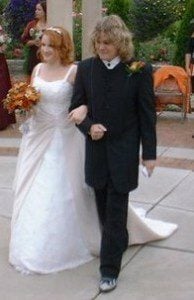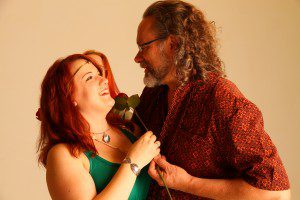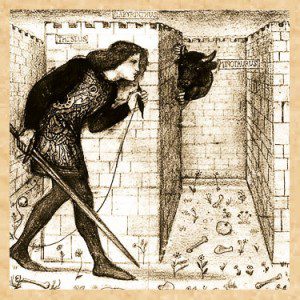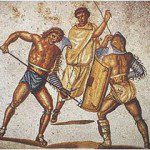 This past weekend I attended the wedding of one of my best friends. It was a simple affair with a limited guest list and very few bells and whistles. The ceremony itself was about three minutes in length, and while the whole affair lacked a lot of pomp and circumstance, it was still meaningful. The officiant’s few words conveyed the gravity of marriage as a commitment, and the late summer setting seemed to whisper “transition” to all who would listen. (September is a glorious time for weddings in the Midwest, and that’s not just because I was married that month, and yes wife I remember the date it’s September
This past weekend I attended the wedding of one of my best friends. It was a simple affair with a limited guest list and very few bells and whistles. The ceremony itself was about three minutes in length, and while the whole affair lacked a lot of pomp and circumstance, it was still meaningful. The officiant’s few words conveyed the gravity of marriage as a commitment, and the late summer setting seemed to whisper “transition” to all who would listen. (September is a glorious time for weddings in the Midwest, and that’s not just because I was married that month, and yes wife I remember the date it’s September 26 25.)
The wedding its self didn’t provide a lot of time for reflection, but I couldn’t help but wonder why we don’t have more rights of passage in American culture. Sure, we celebrate milestones: birthdays, anniversaries, maybe a first driver’s license or a divorce, but all of those generally lack ritual. Some modern faiths have a few rites of passage, bar mitzvahs immediately come to mind, but confirmation in a Christian Church also counts, as does baptism (unless you are a baby/extremely young when it happens and therefore don’t remember it), but for many folks that’s all they get until they die (and those are hard for the deceased to participate in). Away from religious ceremony the only other rite of passage most Americans participate in is their high school (or possibly college) graduation.
 Sometimes I wonder if society’s reluctance to engage in rites of passage is healthy. Wouldn’t it be easier to deal with the aging process if it were worn as a badge of honor instead of something to fight against? I’m a much different person at 40 than I was at 21, wouldn’t a ritual to celebrate that transition and those changes make some sense? Google “rites of passage” online and you’ll get a lot of results, but they all seem to be exclusively geared towards adolescents. I think it’d be great if the aging process was more than a few jokes about mid-life crises and balloons decorated with grim reapers, rites of passage shouldn’t stop at the crux of adulthood. Life is more than just a yearly notch on the wall, our changes and experiences should be celebrated and put into context, both within our social groups and faith traditions. Rites of passage provide context and help us to understand the journey.
Sometimes I wonder if society’s reluctance to engage in rites of passage is healthy. Wouldn’t it be easier to deal with the aging process if it were worn as a badge of honor instead of something to fight against? I’m a much different person at 40 than I was at 21, wouldn’t a ritual to celebrate that transition and those changes make some sense? Google “rites of passage” online and you’ll get a lot of results, but they all seem to be exclusively geared towards adolescents. I think it’d be great if the aging process was more than a few jokes about mid-life crises and balloons decorated with grim reapers, rites of passage shouldn’t stop at the crux of adulthood. Life is more than just a yearly notch on the wall, our changes and experiences should be celebrated and put into context, both within our social groups and faith traditions. Rites of passage provide context and help us to understand the journey.

One of the things that I appreciate about Modern Paganism is that it encourages Rites of Passage. Many Pagan traditions have initiations and degrees that signify spiritual progression and dedication. Browsing this quarter’s Circle Network News, I was both surprised and pleased at the sheer amount of Community Milestones listed. Instead of just obituaries, weddings, and birth announcements, there were bits on boys becoming young men and women embracing the mantle of Crone. We celebrate the turn of the seasons with ritual, so it makes perfect sense to celebrate the turnings of our own lives in much the same way.
My wife and I often talk about our hypothetical child and how we would raise them. We aren’t sure about raising a child in the Craft, but we whole heartedly believe that rites of passage to mark the transitions in their life would be a definite. Puberty is weird and scary enough, no need to hide it in a closet and make it even creepier. Hopefully we could craft rites of passage beyond first period/first pubic hair too, but we’ll jump that hurdle when we get to it.
Life is about more than being born, getting married, and then dying. Celebrate the journey into middle age with the gods, the Earth, and put some meaning behind it. Buying a house or starting a family are major life transitions; I can’t think of a more appropriate time to invoke deity and hear the wisdom of others. It’s probably a little OK to be selfish here too, why not renew those marriage vows or have a second hand-fasting? (Or possibly even a third, my wife and I renew our vows every five years.) Making a partnership work long-term should be celebrated. When my friend Matt graduates from school we are going to incorporate that into ritual because it’s an important marker on his road. We need more rites of passage, not less, and being as we are our own priests and priestesses, they shouldn’t be too hard to put together.













